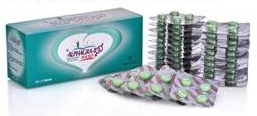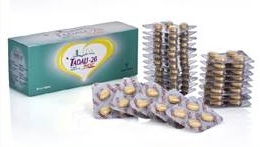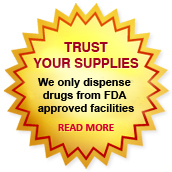Augmentin (Amoxicillin and Clavulanate Potassium Tablets) - Product Information
Augmentin, manufactured by GSK is an antibiotic which is used for the short term treatment of bacterial infections in different parts of the body. Augmentin will not work against infections caused by viruses and should be used only to treat or prevent infections that are proven or strongly suspected to be caused by bacteria. The beta-lactamase inhibitory action of Clavulanate extends the spectrum of amoxicillin to cover a wider range of organisms, including many bacteria resistant to other beta-lactam antibiotics.
Augmentin tablets are available in the strengths of 375 mg, 625 mg and 1000 mg. We also offer the Augmentin DUO Dry Syrup which contains 200mg Amoxicilin and 28.5mg Clavulanic acid (equivalent to 34gm).
We also have in stock Novamox 250 mg & 500 mg capsules which contains Amoxicillin as the active ingredient.
Name of the Drug
We supply original brand Augmentin tablets manufactured by GlaxoSmithKline Pharmaceuticals Ltd (GSK India).
Manufacturer of Augmentin Tablets
GlaxoSmithKline Pharmaceuticals Ltd (GSK India)
Website: www.gsk.com
Active Ingredient present in Augmentin Tablets
The active ingredients present in Augmentin tablets are Amoxicillin and Clavulanate Potassium. Each film-coated tablet contains the following active ingredients:
Amoxycillin Trihydrate IP equivalent to Amoxycillin 250 mg and Potassium Clavulanate IP (as Potassium Clavulanate Diluted IP) equivalent to Clavulanic Acid 125 mg for Augmentin 375 mg
Amoxycillin Trihydrate IP equivalent to Amoxycillin 500 mg and Potassium Clavulanate IP (as Potassium Clavulanate Diluted IP) equivalent to Clavulanic Acid 125 mg for Augmentin 625 mg
Amoxycillin Trihydrate IP equivalent to Amoxycillin 875 mg and Potassium Clavulanate IP (as Potassium Clavulanate Diluted IP) equivalent to Clavulanic Acid 125 mg for Augmentin 1000 mg
Uses of Augmentin Tablets (Amoxicillin and Clavulanate Potassium Tablets)
Augmentin tablets are used for the short term treatment of common bacterial infections such as:
Upper Respiratory Tract Infections (including ENT): e.g. tonsillitis, sinusitis, otitis media
Lower Respiratory Tract Infections: e.g. acute exacerbations of chronic bronchitis, lobar and broncho-pneumonia
Genito-urinary Tract Infections: e.g. cystitis, urethritis, pyelonephritis, female genital infections
Skin and Soft Tissue Infections:
Bone and Joint Infections: e.g. osteomyelitis
Other Infections: e.g. septic abortion, puerperal sepsis, intra-abdominal sepsis, septicaemia, peritonitis, post-surgical infections
Augmentin Tablets - Dosage
Augmentin tablets are available in the following dosage forms: Augmentin 375 (250 mg Amoxycillin and 125 mg Potassium Clavulanate) , Augmentin 625 DUO (500 mg Amoxycillin and 125 mg Potassium Clavulanate) and Augmentin 1000 (875 mg Amoxycillin and 125 mg Potassium Clavulanate).The dosage of Augmentin (Amoxicillin and Clavulanate Potassium Tablets) for various indications is given below:
Children 3-9 months:
1.25ml of Augmentin Syrup 125 three times a day.
Children 9 months - 2 years:
2.5ml of Augmentin Syrup 125 three times a day.
Children 2-6 years:
5ml of Augmentin Syrup 125 three times a day. In severe infections this may be increased to 10ml Augmentin Syrup 125 three times a day.
Children 7-12 years:
5ml of Augmentin Syrup 250 three times daily. In severe infections this may be increased to 10ml of Augmentin Syrup 250 three times a day.
Adults and Children 40kg and over:
1 Augmentin 500 Tablet twice daily for mild to moderate infections.
For lower respiratory tract infections, complicated urinary tract infections or severe infections at other sites, 1-2 Augmentin 500 Tablet three times daily.
Augmentin Tablets - Contraindications
Augmentin Tablets (Amoxicillin and Clavulanate potassium) are contraindicated in patients with a hypersensity to Amoxycillin ,Potassium Clavulanate or any other ingredient present in Augmentin tablets. They are also cointraindicated in patients with a history of allergic reactions to any beta-lactams, e.g. penicillins and cephalosporins as well as in patients with a previous history of previous history of Augmentin associated jaundice/hepatic dysfunction.
Warnings and Precautions
The warnings and precautions to be taken when using Augmentin pills (Amoxicillin and Clavulanate Potassium tablets) are :
- Serious and occasionally fatal hypersensitivity (anaphylactoid) reactions have been reported in patients being treated with penicillin. In case an allergic reaction takes place, treatment with Augmentin tablets should be discontinued and appropriate alternative treatment started.
- Augmentin should be stopped if infectious mononucleosis is suspected since the occurrence of a morbilliform rash has been associated with this condition following the use of amoxicillin.
- Prolonged treatment with Augmentin may also occasionally result in overgrowth of non-susceptible organisms.
- If prolonged or significant diarrhoea occurs after treatment with Augmentin, or the patient experiences abdominal cramps, treatment should be discontinued immediately.
- There have been rare reports of abnormal prolongation of prothrombin time (increased INR) in patients being treatet with Amoxicillin, Clavulanate and oral anticoagulants simultaneously. Suitable monitoring should be undertaken when anticoagulants are prescribed concurrently.
- Augmentin should be used with caution in patients that have evidence of hepatic dysfunction.
Augmentin During Pregnancy
Reproduction studies in animals with orally and parentally administered Augmentin have not shown any teratogenic effects. In a single study in women with preterm, premature rupture of the foetal membrane (pPROM), it was reported that prophylactic treatment with Augmentin tablets may be associated with an increased risk of necrotising enterocolitis in neonates. As with all medications, the use of Augmentin must be avoided in pregnancy, unless considered essential by the doctor.
Augmentin and Alcohol
It has been observed consumption of alcohol during treatment antibiotics can cause side effects, such as stomach upset, dizziness and drowsiness to be increased. Hence alcohol should be avoided during treatment with Augmentin as well as for several days after treatment with Augmentin tablets has been completed.
Use of Augmentin during Lactation
Augmentin may be administered during the period of lactation. Besides the risk of sensitisation, associated with the excretion of trace quantities in breast milk, there are no known adverse effects for the breastfed infant.
Side Effects of Augmentin Tablets
- Infections and infestations:
Common Mucocutaneous candidiasis
- Blood and lymphatic system disorders:
Rare Reversible leucopenia (including neutropenia) and thrombocytopenia
Very rare Reversible agranulocytosis and haemolytic anaemia. Prolongation of bleeding time and prothrombin time
- Immune system disorders:
Very rare Angioneurotic oedema, anaphylaxis, serum sickness-like syndrome, hypersensitivity vasculitis
- Nervous system disorders:
Uncommon Dizziness, headache
Very rare Reversible hyperactivity and convulsions. Convulsions may occur in patients with impaired renal function or in those receiving high doses.
- Gastrointestinal disorders following oral administration to adults:
Very common Diarrhoea
Common Nausea, vomiting
Uncommon Indigestion
Very Rare Antibiotic-associated colitis (including pseudomembranous colitis and haemorrhagic colitis). Black hairy tongue. Superficial tooth discolouration has been reported very rarely in children. Good oral hygiene may help to prevent tooth discolouration as it can usually be removed by brushing.
- Gastrointestinal disorders following oral administration to paediatrics: Common Diarrhoea, nausea, vomiting
Uncommon Indigestion
Very Rare Antibiotic-associated colitis (including pseudomembranous colitis and haemorrhagic colitis) . Black hairy tongue. Superficial tooth discolouration has been reported very rarely in children. Good oral hygiene may help to prevent tooth discolouration as it can usually be removed by brushing.
In all populations nausea is more often associated with higher oral dosages. If gastrointestinal reactions are evident, they may be reduced by taking Augmentin at the start of a meal.
- Hepatobiliary disorders:
Uncommon A moderate rise in AST and/or ALT has been noted in patients treated with beta-lactam class antibiotics, but the significance of these findings is unknown.
Very Rare Hepatitis and cholestatic jaundice. These events have been noted with other penicillins and cephalosporins.
- Skin and subcutaneous tissue disorders:
Uncommon Skin rash, pruritus, urticaria Rare Erythema multiforme Very rare Stevens-Johnson syndrome, toxic epidermal necrolysis, bullous exfoliative-dermatitis, acute generalised exanthemous pustulosis (AGEP)
If any hypersensitivity dermatitis reaction occurs, treatment should be discontinued.
- Renal and urinary disorders:
Very rare Interstitial nephritis, crystalluria
Buy Augmentin Tablets 375 mg, 625 mg and 1000 mg Online From Only $1 per Pill
You can buy Augmentin tablets online from Clear Sky Pharmacy.
Augmentin pills (Amoxicillin and Clavulanate Potassium Tablets) are supplied in a blister pack of 10 tablets.
Augmentin 375 mg, 625 mg and 1000 mg pills, manufactured by GlaxoSmithkline , India are supplied in a strip of 10 tablets.
The 375 mg tablets cost only $1 per unit when you place an order for 300 tablets.
Disclaimer
The above information is provided to the best of our knowledge and in good faith, it is without a warrant of any kind, expressed or implied.
Shipping Restriction
There are no Shipping restrictions for this product.







